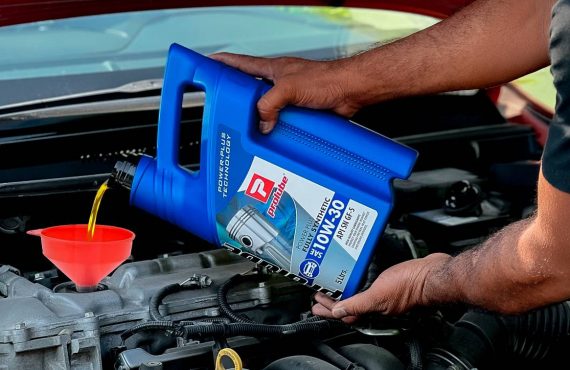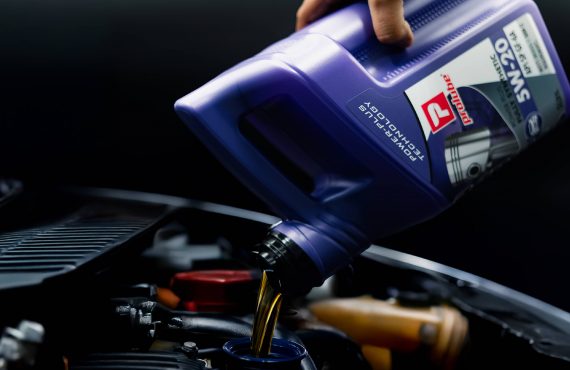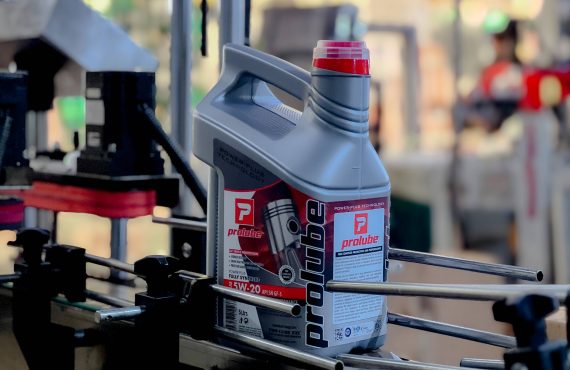Selecting the right oil for your vehicles is one of the most simple and essential steps in keeping them running smoothly. The appropriate commercial vehicle oil can significantly enhance engine performance, fuel efficiency, and long-term durability. However, with so many oil types and specifications on the market, it’s simple to make mistakes that can result in increased maintenance expenses, low viscosity engine oil, and engine damage.
This article will guide you through the most common mistakes to avoid when purchasing oil for commercial vehicles. It will prepare you to make informed decisions that will save you money, protect your engines, and extend the life of your fleet.
Wrong Viscosity Grade in Commercial Vehicle Oil
One of the most common mistakes is choosing low viscosity engine oil. Viscosity controls how thick or thin the oil is at different temperatures, influencing how well it flows and protects the engine. The viscosity grade, denoted by numbers and letters (5W-30), describes how the oil performs at various temperatures.
- The first number (e.g., “5W”) indicates how well the oil flows in cold conditions.
- The second number (e.g., “30”) highlights its high-temperature performance.
Too thick or too thin oil for your operating conditions might result in poor engine protection, reduced fuel efficiency, and excessive engine wear. Refer to the vehicle’s manual or manufacturer specifications for required viscosity grades.
Ignoring Manufacturers Instructions
Vehicle manufacturers recommend oil for specific engines after strict testing. Ignoring these suggestions and purchasing oil for the price or choice can negatively impact your vehicles. Manufacturer requirements frequently specify the oil type, reduce the low viscosity engine oil, and certifications required to achieve the vehicle’s performance standards.
Using oils that do not satisfy the manufacturer’s specifications can result in:
- Inadequate oil can lead to excessive wear.
- The improper oil can cause more friction and reduce fuel efficiency.
- Using non-recommended oils could violate your warranty.

Preferring Cheap Oil Over Quality
Price is essential for fleet managers, but purchasing inexpensive oil without considering quality might result in higher costs in the long run. Lower-quality oils may provide varying levels of protection and durability, resulting in increased engine wear, more frequent oil changes, and ultimately higher repair expenses. High-quality oils, particularly synthetic ones, are intended to protect engines, improve fuel economy, and endure high temperatures.
While low-cost oil may appear less expensive initially, quality oil can save you money in the long run by lowering maintenance expenses and extending engine life.
Not Considering the Operating Environment
Commercial vehicle oil is used in various situations, including metropolitan regions with frequent stops and long-distance highway trucking. The working environment considerably impacts oil requirements; failing to account for them can lead to poor oil performance and wear.
For example:
- City Driving: High temperatures and frequent stops necessitate oil with more excellent thermal stability.
- Long-Haul or Heavy-Duty Use: Continuous driving at high speeds requires oil with excellent thermal resistance.
Neglecting Oil Change Intervals
Failure to follow the proper oil change intervals is a typical mistake that can cause serious engine problems. Over time, commercial vehicle oil degrades, and impurities develop, limiting its effectiveness. Ignoring specified service intervals can result in oil breakdown, increased engine wear, and, in extreme situations, engine failure.
- Synthetic oils sometimes allow longer intervals between changes, benefiting heavy-duty cars.
- Conventional oils usually require more regular replacements.
Tracking mileage and operating conditions might help you decide when to change the oil. Some fleet owners also invest in oil analysis programs to monitor oil conditions, safely lengthen service intervals, and avoid premature changes.
Overlooking the Benefits of Synthetic Oil
Many drivers overlook the benefits of synthetic oil because of its higher initial cost. On the other hand, synthetic oils provide improved protection, operate better in harsh temperatures, and allow longer oil change intervals.
Synthetic oil is ideal for:
- These oils maintain stability in both high and low temperatures.
- Synthetic oil will resist the increased stress better.
- It lasts longer, saving on oil change frequency.
If your fleet operates in harsh environments, synthetic oil may be a reasonable investment to increase performance and lower long-term costs.
Disregarding Industry Standards and Certifications
Oil standards and certifications ensure both quality and performance. It is a mistake to skip lubricants that fulfill these criteria, as they have been tested to assure compatibility with current engines and conformity to environmental and safety guidelines.
Choosing engine oil for trucks that meet or exceed these certifications assures you use a product that will protect your engine and improve its efficiency. Always check for certifications, especially if the vehicle’s manufacturer needs them.
Not Accounting for Seasonal Changes
Seasonal temperature variations can impact oil’s performance. Oil not addressing seasonal changes can produce good cold-weather performance or sufficient heat protection.
- Winter: In cooler temperatures, oils with lower “W” grades (such as 5W-30) can help cold starts by flowing more freely.
- Summer: In hot weather, lubricants with a greater viscosity (such as 15W-40) offer superior engine protection.
Fleets operating under challenging environments may benefit from changing oil regularly or using oils that can operate in a wide temperature range.
Adding Unnecessary Oil Additives
While oil changes might improve performance under certain conditions, excessive or incompatible additives can interfere with the oil’s chemistry and cause difficulties. Modern lubricants already contain chemicals such as detergents, anti-wear mixtures, and friction modifiers aimed at effectively protecting engines.
Adding extra additives may:
- Many additives can alter the oil’s stability.
- Manufacturers do not approve some additives and could void engine warranties.
- Overusing additives may lead to residue build-up, clogging, and other issues.
Use additives only when an expert recommends them or when engine oil for older vehicles is required to meet unique demands or specialized uses.
Failing to Monitor Oil Condition
Finally, failing to check oil conditions frequently might be a costly mistake. Oil monitoring extends beyond simply changing the oil at regular intervals. Oil quality diminishes over time due to impurities, and oxidation, waste product formation, and acid production can all impact performance.
An oil analysis program can help fleet managers monitor the oil’s condition and identify potential concerns before they lead to engine problems. These programs can:
- Extend oil life: By identifying the ideal intervals for oil changes.
- Reduce repairs: Detect early signs of wear, metal particles, or contaminants.
- Improve performance: Keep engines running efficiently.
Monitoring oil conditions is especially important for high-mileage fleets or cars operating in harsh settings. It provides information about the health of engine oil for trucks and helps optimize maintenance schedules.
Final Verdict
By selecting the appropriate viscosity according to manufacturer recommendations and considering your fleet’s operating conditions, you can protect your engines, improve fuel economy, and lower maintenance costs. Remember, oil quality is an investment in your fleet’s performance and lifetime. Take the time to make informed decisions and be proactive with oil changes to keep your vehicles running smoothly.
Visit Pro-Lube for expert advice and high-quality oil products. Making these decisions carefully helps minimize expensive repairs and keep your fleet in top condition, which benefits both your bottom line and your car’s long-term health.







No comments yet.